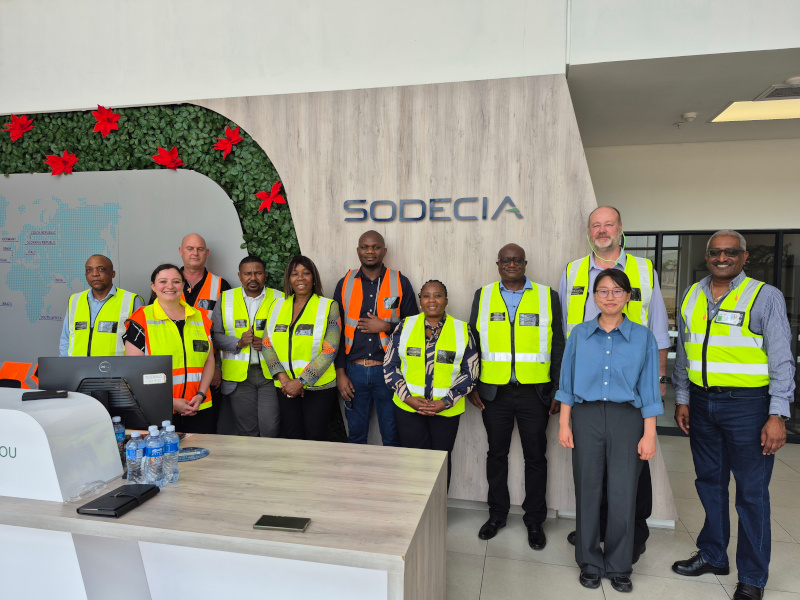Lusaka, Zambia, 01 April 2025 (ECA) - The ECA Sub-Regional Office for Southern Africa organised a study tour on Special Economic Zones (SEZs) to foster automotive value chains in Southern Africa. The study tour, which aimed at exploring incentives and requirements that support development of successful SEZs, was attended by policy makers and private sector representatives from Namibia and Lesotho. The study tour was facilitated by Gauteng Provincial government, South Africa, in close collaboration with the Tshwane Automotive Special Economic Zone (TASEZ) and took place from 25 – 27 March 2025.
During the consultations, Ms. Olayinka Bandele, Chief of the inclusive Industrialisation section at the ECA Sub-regional Office for Southern Africa (SRO-SA) highlighted the crucial role that ECA is playing in supporting the region develop their industrial sectors, by using the AfCFTA as an anchor. She stated that ECA works with the AfCFTA Secretariat, the African Union (AU) Commission and supporting financial institutional agencies such as Afreximbank and the African Development Bank (AfDB) in delivering results to the automotive industry.
Ms. Bandele also noted that, a future seamless movement of goods, services and people across borders will support the sector’s regional value chains, linking it to global value chains. She stressed on the increased appetite for member states to develop their automotive industry which is likely to propel key sectors of the economy including a higher volume of sustainable jobs. She further emphasised that the automotive sector is one of the identified key sectors with demonstrable lasting capability to push the regional industrial cooperation due to its potentially strong local content input that allows for increased beneficiation of raw materials from across a range of countries.
Mr. Msokoli Ntombana, TASEZ’s Business Development Executive, made a presentation on the landscape of South Africa’s automotive industry and the role that TASEZ is currently playing in it. He insisted on the need for effective policy, private sector engagement and a conducive regulatory framework for a successful SEZ. He underscored the importance of integrating Small, Medium, and Micro Enterprises (SMMEs) into the automotive value chain as it presents a range of opportunities from raw material sourcing to manufacturing, distribution, and after-sales services. Mr. Socks further focused on the need for Africa’s homegrown solutions in the automotive industry due to its abundant raw materials spread across the continent including polymers, and metals. He commented on the fact that most Southern African countries continue to operate under Tier 3 (raw material component) of the automotive value chain and also on how the upcoming European Union’s Carbon Border Adjustment Mechanism (CBAM) is likely to affect the competitiveness of Africa’s automotive industry due to its heavy reliance on non-renewable sources of energy in its industry operations.
The Study Tour to TASEZ was an opportunity for senior officials to visit seven manufacturing plants supplying automotive components to Ford Motors and understand the depth of manufacturing capability, including technologies, raw material supply and operations. Firms such as ATD Alliance, Thai Summit, Hesto Harness, and Sodeia were visited over the course of the 3 days of the tour, allowing for intensive discussions on the status of automotive manufacturing in Southern Africa and entry points for SADC member states.
Mr. John Jacobs, Plant Manager of ATD Alliance, a specialised component manufacturer for Ford Company in blow moulding and assembly of automotive parts such as new local content components (Floor Mats, Side Beds, Rear Step Bump and Box Rails)underscored the need for increased beneficiation of higher local content of raw materials from across a range of countries, if Southern Africa is to build a successful automotive regional value chain. He cited some of the challenges experienced in the region in terms of skills shortage and that any mechanism ensuring skills capabilities would create a robust automotive regional value chain in Southern Africa. He specifically, highlighted the following skills capabilities as critical: Robot technicians, tool makers and null makers (both electrical and mechanical as well as project/ manufacturing engineers (from conceptualisation to deployment).
As a way forward, ECA will continue engaging key stakeholder (both public and private) in the automotive industry and support member states successful integration in the regional value chain. UNECA through the Regional Integration and Trade Division (RITD) is also leading a study on standards and norms for successful SEZs in Africa. The study aims to identify the standards and norms, their contexts, critical success factors and enablers that have led to successful SEZs, defined on a range of criteria, across different regions. It also seeks to inform policy formulation to support the establishment and operationalization of new SEZs in Africa, and redesign the existing ones for better effectiveness, particularly in the context of the AfCFTA.”
Issued by:
The Sub-Regional Office for Southern Africa
UN Economic Commission for Africa (ECA)
P.O. Box 30647, Lusaka, Zambia.
Media Contacts:
Mrs. Lavender Degre,
Communication Officer,
Tel: +260 211 228502/5 Ext. 21307
DL: +260 211 376607
Email: lavender.degre@un.org
Issued by:
Communications Section
Economic Commission for Africa
PO Box 3001
Addis Ababa
Ethiopia
Tel: +251 11 551 5826
E-mail: eca-info@un.org
